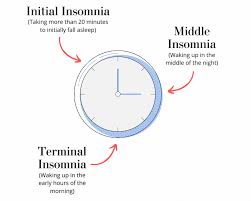Terminal Insomnia Treatment: Strategies for Better Sleep
Terminal insomnia, also known as late insomnia, is a type of sleep disorder characterized by difficulty staying asleep and waking up too early in the morning. This can lead to feelings of fatigue, irritability, and impaired cognitive function during the day. Fortunately, there are effective strategies for treating terminal insomnia and improving the quality of your sleep.
Establish a Consistent Sleep Routine
One of the key strategies for treating terminal insomnia is to establish a consistent sleep routine. Go to bed and wake up at the same time every day, even on weekends. This helps regulate your body’s internal clock and can improve your overall sleep quality.
Create a Relaxing Bedtime Ritual
Create a relaxing bedtime ritual to signal to your body that it’s time to wind down and prepare for sleep. This could include activities such as reading a book, taking a warm bath, or practicing deep breathing exercises.
Limit Stimulants Before Bedtime
Avoid consuming stimulants such as caffeine and nicotine in the hours leading up to bedtime. These substances can interfere with your ability to fall asleep and stay asleep throughout the night.
Create a Comfortable Sleep Environment
Your sleep environment plays a crucial role in the quality of your rest. Make sure your bedroom is cool, dark, quiet, and comfortable. Invest in a supportive mattress and pillows that promote proper spinal alignment.
Consider Cognitive Behavioral Therapy for Insomnia (CBT-I)
Cognitive Behavioral Therapy for Insomnia (CBT-I) is a structured program that helps individuals address the underlying causes of their sleep problems through cognitive restructuring and behavioral interventions. CBT-I has been shown to be highly effective in treating terminal insomnia.
Consult with a Healthcare Professional
If you continue to experience persistent terminal insomnia despite trying these strategies, it’s important to consult with a healthcare professional. They can help identify any underlying medical conditions or psychological factors contributing to your sleep difficulties and recommend appropriate treatment options.
By implementing these strategies and seeking professional guidance when needed, you can effectively treat terminal insomnia and enjoy restful nights of rejuvenating sleep.
9 Effective Strategies for Managing Terminal Insomnia: From Bedtime Routines to Professional Consultation
- Establish a relaxing bedtime routine.
- Create a comfortable sleep environment.
- Avoid caffeine and stimulants close to bedtime.
- Limit screen time before bed.
- Practice relaxation techniques, such as deep breathing or meditation.
- Exercise regularly but not too close to bedtime.
- Avoid heavy meals and alcohol before bed.
- Try cognitive behavioral therapy for insomnia (CBT-I).
- Consult a healthcare professional for personalized advice.
Establish a relaxing bedtime routine.
Establishing a relaxing bedtime routine is a crucial tip for treating terminal insomnia. By creating a consistent wind-down ritual before bed, such as reading a book, taking a warm bath, or practicing relaxation techniques, you signal to your body that it’s time to prepare for sleep. This routine helps calm the mind and body, promoting a smoother transition into restful sleep and reducing the likelihood of waking up too early in the morning. Consistency is key in training your body to associate these calming activities with bedtime, ultimately improving your overall sleep quality and combating the symptoms of terminal insomnia.
Create a comfortable sleep environment.
Creating a comfortable sleep environment is essential for treating terminal insomnia. A cool, dark, quiet, and comfortable bedroom can significantly improve the quality of your rest. Investing in a supportive mattress and pillows that promote proper spinal alignment can help reduce discomfort and encourage better sleep. By optimizing your sleep environment, you create a conducive space for relaxation and restorative sleep, ultimately aiding in overcoming the challenges of terminal insomnia.
Avoid caffeine and stimulants close to bedtime.
To improve terminal insomnia, it is recommended to avoid consuming caffeine and other stimulants close to bedtime. Caffeine is a powerful stimulant that can disrupt your sleep cycle and make it difficult to fall asleep. By cutting back on caffeine intake in the hours leading up to bedtime, you can help your body relax and prepare for a restful night’s sleep. This simple adjustment can have a significant impact on your ability to stay asleep throughout the night and wake up feeling refreshed in the morning.
Limit screen time before bed.
Limiting screen time before bed is a crucial tip for treating terminal insomnia. The blue light emitted by screens, such as phones, tablets, and computers, can disrupt our body’s natural sleep-wake cycle by suppressing the production of melatonin, a hormone that regulates sleep. By reducing screen exposure in the hours leading up to bedtime, we can signal to our bodies that it’s time to wind down and prepare for restful sleep. This simple adjustment can significantly improve our ability to fall asleep and stay asleep throughout the night, ultimately promoting better sleep quality and overall well-being.
Practice relaxation techniques, such as deep breathing or meditation.
To improve sleep quality and combat terminal insomnia, practicing relaxation techniques like deep breathing or meditation can be highly beneficial. These techniques help calm the mind and body, reducing stress and promoting a state of relaxation that is conducive to falling asleep and staying asleep throughout the night. By incorporating these practices into your bedtime routine, you can create a peaceful environment that encourages restful sleep and alleviates the symptoms of terminal insomnia.
Exercise regularly but not too close to bedtime.
Regular exercise is a beneficial strategy for treating terminal insomnia, but it’s important to time your workouts appropriately. Engaging in physical activity earlier in the day can help regulate your sleep-wake cycle and promote better sleep quality. However, exercising too close to bedtime can have a stimulating effect on the body, making it harder to fall asleep. Aim to finish your workout at least a few hours before bedtime to allow your body and mind to wind down and prepare for a restful night’s sleep.
Avoid heavy meals and alcohol before bed.
Avoiding heavy meals and alcohol before bed is crucial in the treatment of terminal insomnia. Heavy meals can lead to indigestion and discomfort, making it difficult to fall asleep and stay asleep throughout the night. Similarly, consuming alcohol close to bedtime may disrupt the quality of your sleep by interfering with your sleep cycle and causing fragmented rest. By avoiding heavy meals and alcohol before bed, you can promote better sleep hygiene and increase your chances of experiencing a more restful night’s sleep.
Try cognitive behavioral therapy for insomnia (CBT-I).
For individuals struggling with terminal insomnia, trying cognitive behavioral therapy for insomnia (CBT-I) can be a highly effective treatment approach. CBT-I is a structured program that focuses on addressing the underlying causes of sleep disturbances through cognitive restructuring and behavioral interventions. By working with a trained therapist, individuals can learn techniques to improve their sleep habits, challenge negative thought patterns related to sleep, and establish a more consistent and restful nighttime routine. Research has shown that CBT-I can lead to significant improvements in sleep quality and duration, making it a valuable tool for managing terminal insomnia symptoms and promoting better overall well-being.
Consult a healthcare professional for personalized advice.
Consulting a healthcare professional for personalized advice is crucial when addressing terminal insomnia. A healthcare provider can conduct a thorough evaluation of your sleep patterns, identify any underlying medical conditions or psychological factors contributing to your insomnia, and recommend tailored treatment options. By seeking guidance from a healthcare professional, you can receive expert support in managing your sleep disorder effectively and improving the quality of your rest.



